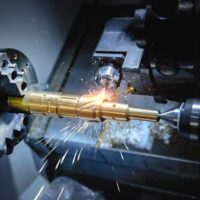CNC manufacturing, or computer numerical control machining, is a common manufacturing method that employs computerized, fast-cutting tools to make shapes from metal or plastic stock. CNC machines can precisely and reliably cut any metal alloy and rigid plastic material.
Top-tier CNC machining facilities have a selection of machines at their disposal, which can simultaneously mill, turn, drill, or execute all three operations.
Types of CNC Machining Services
CNC Machining services require a high level of skill to operate. They include:
CNC Milling Machine
A CNC mill employs computer controls to cut a range of materials. By translating precise numerical and alphabetic programming, mills can move the spindle differently.
Numerous operations, like threading, slotting, and chamfering, rely on this technology.
CNC Lathing Machine
A CNC lathe is used to make cylindrical parts like shafts and bushings. The precision offered by CNC machines is far superior to that of manual lathes.
Because they have fewer axes, manual machines are often smaller and more compact than CNC lathe machines.
CNC Multi-Spindle Machining
A CNC multi-spindle machine consists of multiple spindles arranged in a drum. The drum performs numerous tasks concurrently while horizontally rotating and shifting between various positions.
With each drum rotation, a step in the procedure is completed. Utilizing this machine’s tools or services is typically more productive and cost-effective than using numerous CNC machines.
CNC Drilling Machine
CNC drilling equipment uses a revolving cutting tool to enlarge holes in stationary objects. CNC drilling machines are more accurate and adaptable than traditional drilling equipment.
Factors to Consider When Choosing a Machining Service
Here are a few things to consider when choosing a CNC machining service:
Turnaround Time
An experienced company has a short turnaround time since the machining may operate 24 hours a day. This way, you are guaranteed a quick response time.
Precision
Consider a CNC service provider that pays close attention to every detail. Precision starts from the project’s onset in the raw materials they use. The service provider should use raw materials that have minimal waste to prevent excess expenses.
The provider must also be adaptable to the product manufacturing sector. They need to work closely with you to deliver your vision and change any modifications you may suggest.
Materials
Some materials used in CNC machining include:
Stainless Steel
Today’s stainless steel market offers a vast array of alloys. 304, 416, 316, and 17-4 PH are frequent CNC machining grades. These alloys have a natural protective oxide layer, making stainless steel ideal for harsh environments.
Aluminum
Aluminum is an excellent material for CNC-machined components due to its corrosion resistance, machinability, and lightweight. In addition to being thermally and electrically conductive, aluminum alloys are also suitable for electronics and thermal management.
Titanium
Titanium alloys are corrosion-resistant, durable, relatively lightweight, and robust. Titanium, the noblest metal, also excels in hostile environments where other metals might fail.
Quality Control
When checking the quality of the company you’re about to work with, a few things to have in mind include:
- Quality of materials
- Type of equipment and technology used
The quality of the company is a factor you cannot compromise on. It’s best to find another company if you notice a few red flags.
Conclusion
CNC machining can be used in the aerospace, agriculture, transportation, and even food and beverage industries. It can reduce manufacturing time since businesses no longer have to spend time locating the necessary machined parts, and the products they manufacture are incredibly precise.
The cherry on top is that all these benefits are available at a low cost.


